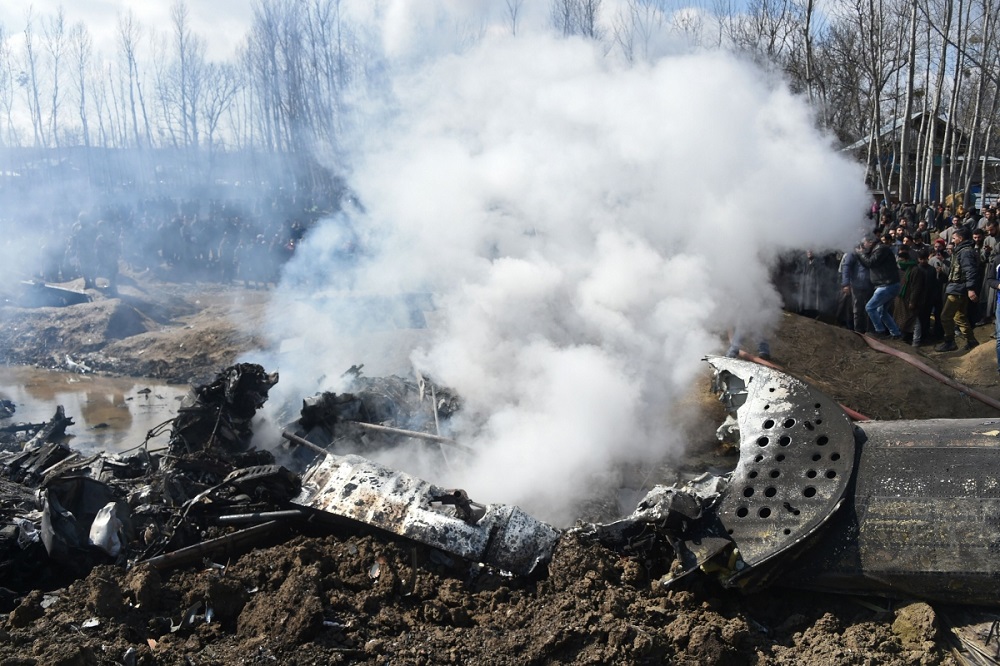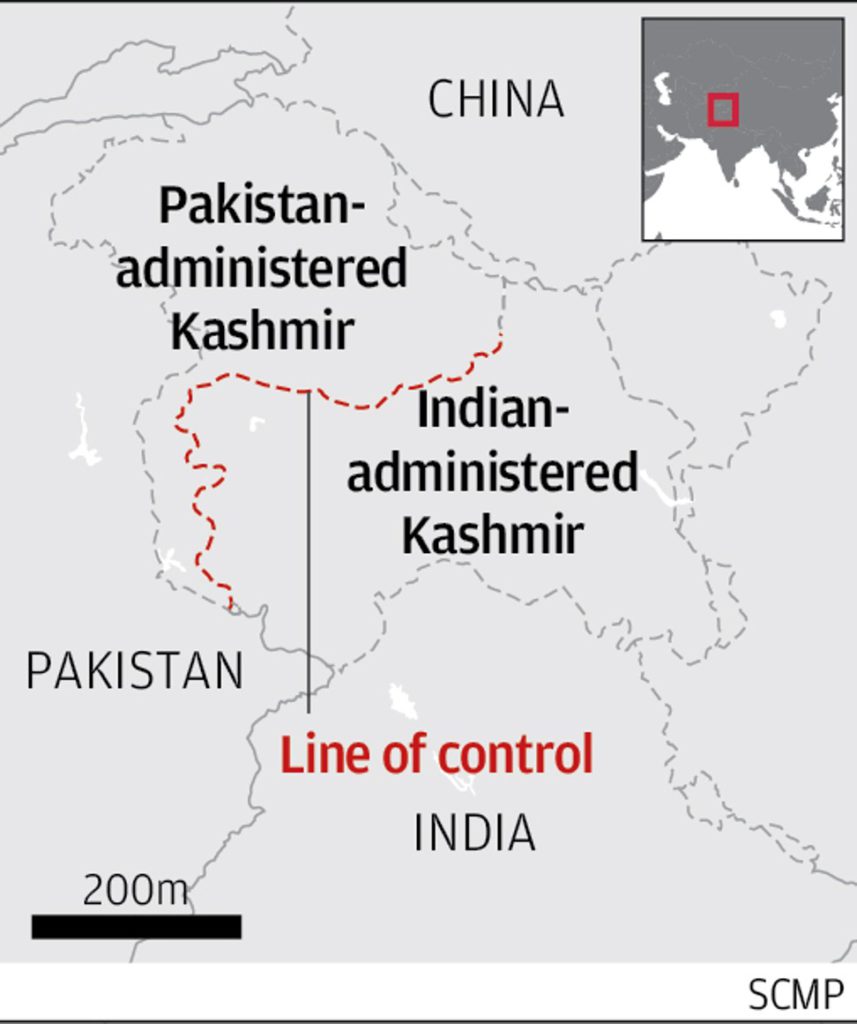[Analytics] Pakistan closes airspace ‘until further notice’, airports shut in India, as tensions escalate

Smokes billows from the remains of an Indian Air Force helicopter after it crashed in Budgam district, on the outskirts of Srinagar, Kashmir. Photo: AFP
Pakistan and India said on Wednesday they had shot down each other’s warplanes in the disputed Kashmir region, in a dramatic escalation of the dangerous confrontation between the nuclear-armed rivals.
Pakistan said it downed two Indian Air Force jets in its airspace and captured two pilots, but insisted it did not “want to go towards war” with its neighbour, reported the South China Morning Post.
One of the captured pilots was injured and was being treated in hospital, while the other was in custody, said Major General Asif Ghafoor, Pakistan’s military spokesperson. He made no mention of whether they would be returned to India.
India confirmed the loss of one of its planes and said it had shot down a Pakistani fighter jet. Four bodies were recovered from the wreckage of an Indian Air Force chopper, said officials.

Ghafoor said the jets had been shot down after Pakistani planes earlier flew across the Line of Control, the de facto border in Kashmir, to the Indian side in a show of strength, hitting non-military targets including supply depots.
“The Pakistan Air Force was ready, they took them on, there was an engagement. As a result both the Indian planes were shot down and the wreckage of one fell on our side while the wreckage of the other fell on their side,” Ghafoor said.
In response to PAF strikes this morning as released by MoFA, IAF crossed LOC. PAF shot down two Indian aircrafts inside Pakistani airspace. One of the aircraft fell inside AJ&K while other fell inside IOK. One Indian pilot arrested by troops on ground while two in the area.
— Maj Gen Asif Ghafoor (@OfficialDGISPR) February 27, 2019
Pakistani Prime Minister Imran Khan on Wednesday called for talks with India and hoped “better sense” would prevail so that both sides could de-escalate.
“History tells us that wars are full of miscalculation. My question is that given the weapons we have can we afford miscalculation,” Khan said during a televised broadcast to the nation. He said Pakistan was “ready to cooperate”, adding: “Let’s sit together to talk to find a solution.”
The strikes were the deepest inside Pakistani territory since the neighbouring countries last went to war over Kashmir in 1971.
Pakistan has closed its airspace “until further notice”. At least six airports were closed in India, and a vast area of airspace north of New Delhi was closed to civilian flights.
The rising tensions prompted global leaders to urge both sides to show restraint.
China, a long-standing close ally and arms supplier to Pakistan, said it hoped the neighbours would “exercise restraint, take effective measures to strengthen dialogue, and maintain two sides’ fundamental interests and the regional peace and stability”.
“We hope they will avoid deterioration of the situation,” Foreign Ministry spokesman Lu Kang said at a media briefly.
US Secretary of State Mike Pompeo on Wednesday said the US encouraged the rival neighbours to “exercise restraint, and avoid escalation at any cost”.
Expressing “great concern” over the escalating row, Malaysia issued a travel advisory for Malaysians to avoid non-essential travel to the affected areas.
The European Union and New Zealand also advised the rival neighbours to show restraint.
“New Zealand condemns all forms of terrorism and urge all members of the international community to work together to eradicate terrorist activity,” said foreign minister Winston Peters in a statement.
The Taliban, meanwhile, warned that ongoing clashes between India and Pakistan would impact the Afghan peace process, urging India to refrain from further military action.
“The continuation of such conflict will affect the Afghanistan peace process,” Taliban spokesman Zabiullah Mujahid said.
“India should not carry any further violence in Pakistan because its continuation will affect regional security also the continuation of such conflict will cost a lot to India.”
The incursion over the heavily militarised Line of Control came a day after Indian warplanes carried out a strike in Pakistan on what New Delhi said was a Jaish-e-Mohammed militant training camp, in retaliation for a February 14 suicide blast in Kashmir that killed 40 Indian troops.
Indian foreign ministry spokesman Rajeesh Kumar announced that a Pakistan jet was hit as it took part in an operation “to target military installations on the Indian side”.
“The Pakistani aircraft was seen by ground forces falling from the sky on the Pakistan side,” he told a briefing. “In this engagement, we have unfortunately lost one Mig-21. The pilot is missing in action. Pakistan has claimed that he is in their custody.”
Indian police said officials had yet to identify the four bodies that were recovered from the wreckage of an Indian Air Force helicopter that crashed at the site in Budgam area.
The confrontation represents the first major foreign policy crisis for Pakistani Prime Minister Imran Khan, who is believed to be close to the powerful military and who came to power last year vowing to seek dialogue with New Delhi.
Pakistan has denied involvement in the Kashmir bombing on February 14.
While India has consistently accused its neighbour of supporting extremist groups, Pakistan has equally vehemently denied any role in attacks in India and its only Muslim-majority state, Kashmir.
The Himalayan region has been divided between India and Pakistan since independence in 1947. They have fought two of their three wars over the territory.
Previously, the US and other members of the international community have acted to defuse tensions.
“If I were Washington, I’d be in overdrive making phone calls and signalling that it wants tensions to be de-escalated now,” said Moeed Yusuf, an expert at the US Institute of Peace in Washington.
“The risks of letting this play out are too great.”
Additional reporting by Agence France-Presse and Reuters